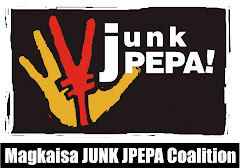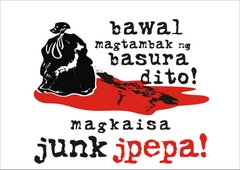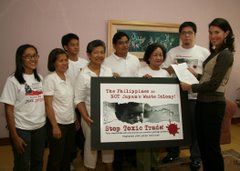Golda Benjamin, Magkaisa Junk JPEPA Coalition
Maitet Diokno-Pascual, Magkaisa Junk JPEPA Coalition
Dr. Leah Sumaco-Paquiz, Philippine Nurses Association
Marie Marciano, EcoWaste Coalition
Much has been said and written about the toxic and unconstitutional provisions in the proposed Japan-Philippines Economic Partnership Agreement. Such provisions alone are sufficient grounds for rejecting the JPEPA outright and working for it to be junked. The proposed agreement’s economic provisions are given less attention. As JPEPA is first and foremost an economic agreement, it is but right to focus on this aspect of the proposed agreement. What we see is a very lopsided agreement that heavily favors Japan, an economic power that doesn’t need JPEPA to bolster its already strong economic hold, especially vis-à-vis our country.
Simply go over the proposed Agreement and its Annexes page by page and you will see that the Philippine negotiators of Mrs. Arroyo gave away practically all of the Philippines to Japan, in exchange for virtually nothing. Is this a bad deal? Definitely. Is it better than No Deal? Definitely not. The best option, in fact the only option for the Senate and this government is to junk JPEPA.
A close scrutiny of JPEPA shows there is a clear imbalance of commitments, substantially favoring Japan, on tariff and non-tariff trade in goods, on the movement of natural persons, and on the Singapore issues,
LOPSIDED DEAL IN AGRICULTURE AND FISHERY
For example, in agriculture, only rice and five of its subheadings were excluded from the JPEPA by Mrs. Arroyo’s negotiators. No fish products were excluded; 46 of 114 tariff lines for fish products in the Philippine schedule will be duty free from year one.
Furthermore, tariffs on agricultural products that are not duty free from year one are much lower than the corresponding WTO bound rates . For instance, the base rate for various vegetables and fruits is 7%, much lower than their WTO bound rate of 40%. The base rates for fish products range from 3% to 10% which are far lower than the WTO bound rates of 30% to 40%.
Having given more away to Japan than Japan did to the Philippines, does the JPEPA nevertheless open the doors for our major agricultural exports? Not.
Japan excluded 197 sub-headings covering various agricultural products. Even dairy products, oranges, shiitake mushrooms—where we pose no threat to Japan’s local producers—remain protected in JPEPA. Consistent with its protection under WTO agreements, Japan kept away from JPEPA agricultural products excluded in the former, with very few exceptions. Less sensitive products have been placed under quota or deferred for market access negotiations in some indeterminate future. Non-sensitive agricultural products that are not excluded such as bananas (traditional export of the Philippines to Japan) will nevertheless have to wait five to 10 years before enjoying duty free access to Japanese markets. As a whole, agricultural products such as fresh asparagus and other fresh vegetables that Japan agreed to have duty free status in year one already enjoy very low duties of 3% and below. In effect, Japan gave nothing away of its agriculture and instead protected its agriculture in JPEPA.
Japan also maintained protection for its fishery sector. Of the 200 tariff lines for fish products in Japan’s JPEPA schedule, 59 are forever excluded from duty-free treatment; 15 are for deferred market access negotiations; 72 for phased tariff removal; and only 25 duty free from year one.
LOPSIDED DEAL IN INDUSTRY
Mrs. Arroyo’s JPEPA negotiators gave duty free entry from year one to a very long list of industrial products such as garments, refrigerators, air conditioners, dishwashers. Domestic industries such as automotive vehicles and their parts that could have benefited from some protection, at the very least through deferred market access negotiations under the JPEPA, were instead subjected to a tariff phaseout by the negotiators of Mrs. Arroyo.
Trade and industry sources say that Japan’s primary negotiating objective was the automotive industry. Mrs. Arroyo’s negotiators gave Japan what it wanted, at the expense of workers in the industry and other non-Japanese investors. In giving Japan its prized objective, did Mrs. Arroyo’s negotiators gain something in exchange? Not.
In JPEPA, the Philippines bound its applied MFN tariffs on industrial products at a level much lower than the WTO bound rates, using the former as the base rates for the phased tariff removal in the JPEPA. This is another giveaway, the first time the Philippines has done so in an international agreement outside the ASEAN. Did Mrs. Arroyo’s negotiators get a correspondingly heavy commitment from Japan in exchange for this giveaway? Not.
What did Japan give away? Nothing it already has: Industrial products already enjoy very low tariffs in Japan which are bound at the WTO. Products such as electronics and furniture are already duty free, so declaring them duty free entry under the JPEPA is meaningless. Japan imposes tariffs of 5% and above on a few manufactured products such as garments, made up textile articles and footwear. These have been given duty free entry from year one in the JPEPA. However, such products will enjoy duty free entry only if they comply with the rules of origin as provided in the JPEPA. That is, our garments exports to Japan must be made from raw materials such as fabrics that we ourselves produce, or that we import from ASEAN or Japan. Since the country’s textile industry is virtually non-existent, and since most of our garments are made from fabrics or threads from China or countries outside Japan or ASEAN, then
the duty free entry does not apply.
In effect, the little that Japan gives away through duty free access it takes back through the rules of origin under JPEPA. Given the imbalance of commitments, this will more likely result to more of Japan’s goods entering the Philippines duty free and less of Philippine goods enjoying duty free status for failing to comply with JPEPA’s rules of origin. Thus free trade under JPEPA is not free for Philippine industrial goods.
And this is called partnership?
UNDERMINING PHILIPPINE POSITION VIS-A-VIS MULTILATERAL TRADE ISSUES
Mrs. Arroyo’s negotiators gave away the country’s negotiating leverage in the WTO by agreeing to negotiate on the controversial Singapore issues without getting anything in return for doing so. Her negotiators were either unmindful of, or completely ignored the fact that on the subject of investments; apart from resisting its inclusion in the WTO agenda, the Philippines was among those calling for the following:
• disciplines on undesirable investor conduct such as Restrictive Business
Practices; bribery and illicit payments, destruction of the environment, among others;
• a firm development dimension in the form of specific as opposed to general flexibility clauses that would allow developing countries to continue imposing prohibited performance requirements such as technology transfer.
Whether due to sheer incompetence or gross insensitivity, Mrs. Arroyo’s negotiators are taking the Philippines several steps back in trade negotiations that many of us in civil society have severely criticized as flawed and biased. Rather than moving forward, Mrs. Arroyo’s JPEPA negotiators have pulled down the country’s negotiating position. Yes there is something worse than the WTO. It’s called JPEPA.
OVERSTATING THE BENEFIT TO NURSES
Mrs. Arroyo’s negotiators insist that they secured an excellent deal for our nurses, but they overlook the difficult bureaucratic, cultural and knowledge hurdles that Filipino nurses must overcome in order to practice their profession in Japan. Filipino nurses, in addition to being qualified under Philippine law and having had three years work experience, must have at least six months of language instruction in Japan and training supervised by a “Kangoshi” or Japanese nurse. In order to extend one’s stay as a nurse in Japan, the Filipino nurse must be a qualified kangoshi, that is, (s)he must have passed the qualifying examination (in Japanese) for kangoshi. Like other overseas Filipinos, nurses working abroad need to earn enough to recover the investments and repay the debts incurred in order to become a nurse and get the chance to work overseas. And yes, they must earn also to support their families left behind. Overcoming the cultural and knowledge hurdles may not be worth the time spent in queuing for a job as a kangoshi in Japan.
JPEPA is highly disadvantageous to the Philippine economy and its people. It must be junked, or the Philippines—and our children’s future— will be.
Monday, May 12, 2008
Subscribe to:
Post Comments (Atom)






No comments:
Post a Comment